
 Flash News
Flash News
Celibashi: The CEC platform fell victim to several cyberattacks during the elections
Stalking and fake profiles on social networks, several arrested and prosecuted in Tirana
Tirana's road police with an "iron fist": 14 arrested in the last few hours, around 6,000 fines
Artan Lame passes away at the age of 58
Murder of Ermir Dedja, two people are wanted, the perpetrators' vehicle was secured

While the needs for investment in infrastructure, education, and health are too great to cover the gap in standards with the EU, Albania is experiencing chronic problems in terms of planning and execution of public investment funds.
Official data for the first quarter of 2025 show that capital investments reached around 14 billion lek, the lowest value since 2010. Funds realized compared to the plan were 33% lower and compared to last year's actuals were 11% lower.
Investment funds are "overspending" because some of the large investments in road infrastructure are being awarded through PPP concessions, while the construction of the New Port in Porto Romano is not progressing according to expectations due to the lack of a winner from the competition yet.
Since 2017, over 60% of capital investments have been covered by domestic revenues, while the stock of signed and undrawn foreign loans exceeded 2 billion euros in the first quarter of 2025.
Foreign-funded projects are becoming increasingly rare. From 34 billion lek in foreign funding in 2012, during 2023-2025 there are only 4-5 billion lek. The only new projects being financed by foreign funds are the Durrës-Rrogozhinë railway (EBRD-EU) and the Tirana-Durrës-Rinas railway.
The sharp decline in capital investments with budget funds is related to canceled tenders and court disputes in the last two years. EU funds are also going through the same, but even more difficult, practices.
The data shows that public investment policy continues to be cyclical, dependent on extreme events such as earthquakes and pandemics more than on a visionary long-term development plan.
In recent years, budget investments have suffered from chronic poor execution. By October 2024, only 30% of the planned capital expenditures for the year had been implemented, an underperformance that is recurring every year. More than half of the funds were disbursed in November-December in previous years.
Ministries plan more projects than they can launch, while the budget is revised several times by normative acts, further complicating the final realization of funds. Most important projects are not supported by feasibility studies.
Administrative capacities remain limited. There are 48 vacancies in procurement agencies. The failure to implement public investments creates negative effects on the country's economic growth with multiple consequences.
Unlike other developing countries, the failure to realize public investments in our country does not come from a lack of funds, but from a lack of efficient projects and procedures./ Monitor
Latest news

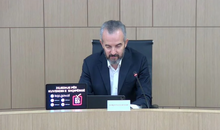


Patient dies during surgery, doctor prosecuted in Durrës
2025-05-22 12:54:55

The “Black Eagle” dossier in Brussels exposes money laundering in Albania
2025-05-22 12:39:16
Berisha publishes video: Voter lists and ballots were found in the village bar
2025-05-22 12:30:29




"5D" file, debate between the defendants' lawyers
2025-05-22 11:37:05

Hoxha: The Troplini received projects from the Prime Minister, appointed leaders
2025-05-22 11:16:59
Këlliçi: The elections, a farce organized by the state and organized crime
2025-05-22 11:07:19
"Toyota Yaris", GJKKO sentences lawyer Radovan Çela to 4 years in prison
2025-05-22 10:56:47
Artan Lame passes away at the age of 58
2025-05-22 10:45:00


Anti-drug mega-operation, checks at the Port of Vlora
2025-05-22 10:13:54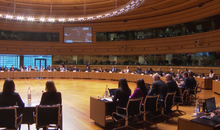



European Union's top diplomat Kallas visits Serbia and Kosovo
2025-05-22 09:36:58
Capital investments at lowest level since 2010
2025-05-22 09:27:12
Two Israeli Embassy staff members killed in Washington
2025-05-22 09:12:46
Pyjet tropikale pësuan shkatërrim rekord në vitin 2024
2025-05-22 09:04:20
Foreign exchange, May 22, 2025
2025-05-22 09:00:12

Accident on the Durrës-Tirana highway, vehicle overturns on the road
2025-05-22 08:31:24

Horoscope, what do the stars have in store for you today?
2025-05-22 08:08:02
Showers, what are the temperatures expected to be like during the day?
2025-05-22 07:54:04
Morning Post/ In 2 lines: What mattered yesterday in Albania
2025-05-22 07:41:33


Germany extends the stay of its troops in Kosovo
2025-05-21 22:19:22
Journalist: Xhevdet Troplini alongside a politician
2025-05-21 22:00:07
Amnesty International: Camps in Albania, a reflection of an inhumane system
2025-05-21 21:49:09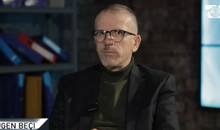
This is the first Albanian justice collaborator
2025-05-21 21:39:45
Bitcoin breaks historical record: Reaches $109,302
2025-05-21 21:36:06
Raped by colleague at the civil registry office, victim fired from job
2025-05-21 21:08:47
Hyn në fuqi vendimi i BSH/ Kredia për blerje banese kufizohet nga 1 korriku
2025-05-21 21:04:37
“Nga dhuna e burrit humba fëmijën”, nëna e dy të miturve kërkon drejtësi
2025-05-21 20:50:23
The government extends the stay of Ukrainians in Albania
2025-05-21 20:45:04
Social networks: Friend or foe of our personal relationships?
2025-05-21 20:22:33





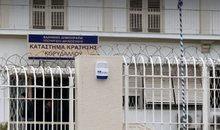

The famous soprano of TKOB passes away prematurely
2025-05-21 18:27:50

Donald Trump's son says he might one day run for US president
2025-05-21 17:53:20

Israel's Eurovision result raises questions about voting
2025-05-21 17:23:29
Florence, two Albanians arrested with 23 kg of cocaine
2025-05-21 17:03:20
Sailing suspended due to bad weather in Vlora
2025-05-21 16:58:12
The abolition of the vote as a triumph of banality
2025-05-21 16:41:56


Operation "Bridge"/ Ekil Nderjaku is sentenced to "prison arrest"
2025-05-21 16:08:32

Who needs more physical exercise: Women or men?
2025-05-21 15:43:25
Former Ukrainian politician shot dead near a school in Madrid
2025-05-21 15:32:18
Operation "Bridge"/ Ekil Nderjaku is given another security measure in his cell
2025-05-21 15:22:37
Chocolate will reach high prices! Cocoa production in serious crisis
2025-05-21 15:11:34




"Grandma", "beast", the nicknames used by Albanian and Italian traffickers
2025-05-21 14:26:47
Pope Leo asks Israel to allow humanitarian aid into Gaza
2025-05-21 14:18:42

Document/ How did Nuredin Dumani hit Xhevdet Troplini's group of traffickers?
2025-05-21 14:05:45

Megaoperation/ Group based in Durres, names of Albanian traffickers revealed
2025-05-21 13:42:44
Former politician shot dead outside his children's school
2025-05-21 13:39:27
A ka BE-ja ende mjete efektive për t'i shkaktuar dhimbje Rusisë?
2025-05-21 13:26:33
Berisha: We will never accept such choices, no one can force us to accept them
2025-05-21 13:25:29




A 24-year-old man was found dead in Lake Farka.
2025-05-21 12:37:34

The abolition of the vote as a triumph of banality
2025-05-21 12:18:53

The only name for May 11th is: Electoral Terrorism
2025-05-21 12:06:25


Letter-order from Belgium, SPAK checks 4 premises, 33-year-old arrested in Berat
2025-05-21 11:37:31
Hajj 2025/ Everything you need to know about the annual pilgrimage to Mecca
2025-05-21 11:28:43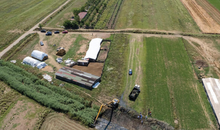

The appeal of the GJKKO leaves the head of the Road, Roven Zeka, in prison
2025-05-21 11:02:16

Kuçova! 66-year-old man sexually harasses 17-year-old girl
2025-05-21 10:41:40
